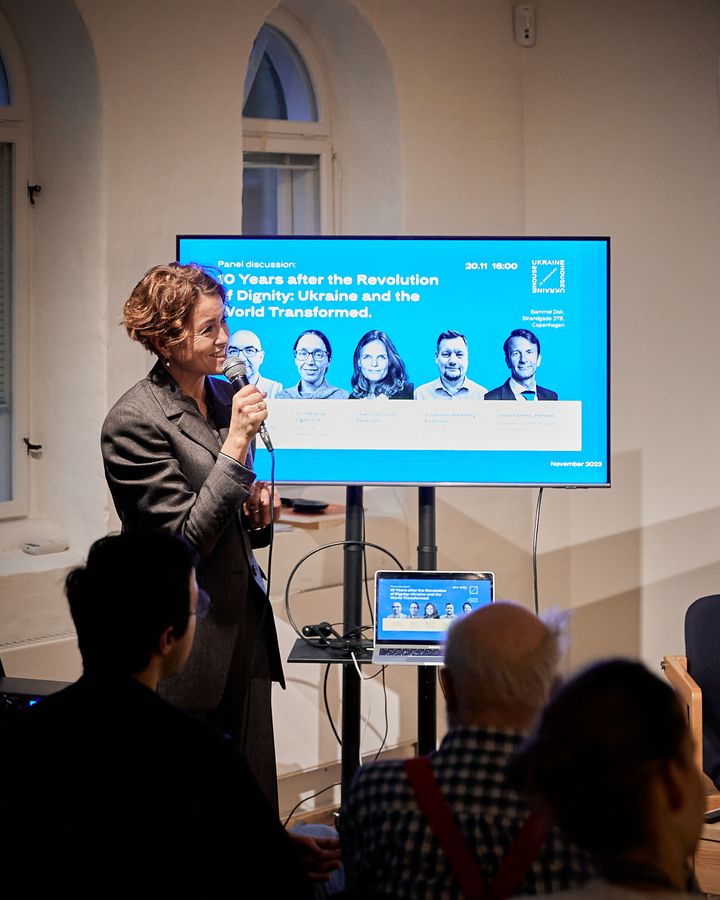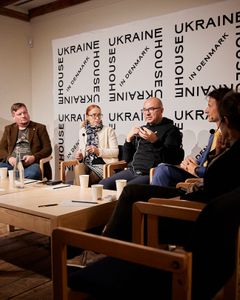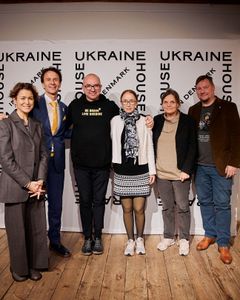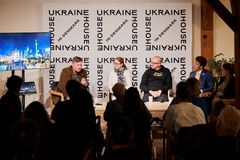10th anniversary of the Ukrainian Revolution of Dignity
On Nov. 21, 2023, Ukraine commemorated the 10th anniversary of the Ukrainian Revolution of Dignity, a pivotal moment in history which was followed by a decade of transformation since hundreds thousands of Ukrainians gathered in late November 2013 to protest against a government move away from an EU-Ukraine Association Agreement. The revolution changed the course of Ukrainian history, its conclusion marked by a loss of 100 lives, a change in government, and the occupation of Crimea, Donetsk and Luhansk Oblasts.
In honour of the occasion, we’d like to share key takeaways from our panel discussion “Ukraine and the world transformed: 10 years since the Revolution of Dignity” that took place on Nov. 20 at Ukraine House in Denmark.

Volodymyr Yermolenko, Analytics Director at Internews Ukraine, highlighted the Ukrainian fight for freedom and European standards of life.
-
“I think Putin is afraid of freedom. Putin is afraid of freedom because Putin is afraid of a society where people are governing by themselves. And I do think that this sentiment is very well known in Denmark and Europe – being governed by yourself, by your community, by your city. But it's not very well known in Russia… So the story of Ukraine is a story of ‘freedom despite.’”
-
“I think for Ukrainians, dignity means a right not to be annihilated and humiliated. You have your place on Earth and in history. You as a person, you as a community. Nobody should take this place, this space of freedom, this time of freedom from you.”
-
“The Russian empire, the occupiers don't give you any space, even for physical movement, let alone for your freedom, for your actions, for your thoughts, for your ideas. This is one of the key metaphors, the very physical metaphors. And Ukrainians, on Maidan, they were fighting against that. They were fighting against an empire that doesn't give you space, not only geographical.”
Tetyana Ogarkova, Head of International Outreach at Ukraine Crisis Media Center, shed light on the terrible price Ukrainians pay for living in dignity.
-
“I remember very clearly these bloody days of Feb. 18-20, 2014. As you probably know, Russian soldiers who participated in the annexation of Crimea, they had this date of Feb. 20 on their medals, because it was day one of this war, this war which is still ongoing. So Russia started the war on the 20th of February, 2014.”
-
“I talked to a Ukrainian filmmaker and this conversation impressed me a lot. He said: what is happening on the front line is that thousands of Ukrainians, who were civilians, are in the army today. Now, to defend Ukraine, freedom and democracy, they have to kill. They have to kill russian soldiers every day - and the time during which somebody is made to be able to kill, it's much shorter than the time it takes for this person to come back to this human condition. So we are in a way also sacrificing our humanity in order to stand strong against this regime, against this aggression.”
Johannes Wamberg Andersen, a Danish historian, highlighted Ukrainian unity.
-
“Ukraine was vaccinated from violence because it has seen so much savagery in the 20th century with the Holodomor, World War II, so I think that's why people said it's too much when they had seen how brutally the police beat students in 2013. I saw a nation come together and people were talking about children as OUR [the nation’s] children.”
Charlotte Flindt Pedersen, director of the Danish Foreign Policy Society emphasised the transformation of Ukrainian society between the Orange Revolution and the Revolution of Dignity.
-
“There was civil society development in Ukraine, which came together on Maidan in 2004 during the Orange Revolution. That was the first transformation, and it was also the first, you could say, counter-action from the кussian side, when they started the whole disinformation warfare.”
Hanne Severinsen, Former vice chairperson for Liberal Group Council of Europe is sure that Ukraine deserves peace with justice.
-
“Back in 2004 people thought that the new president would give them a wonderful society and then they were disappointed. In 2013, Ukrainian society realized that it’s not enough just to change the president. The lesson was learned, and I think it was a fantastic result of the revolution of Dignity. People became aware that it was not in search of having a new leader, but in having new institutions.”
Photos by Alex Benes
Billeder



Følg pressemeddelelser fra Ukraine House in Denmark
Skriv dig op her, og modtag pressemeddelelser på e-mail. Indtast din e-mail, klik på abonner, og følg instruktionerne i den udsendte e-mail.
Flere pressemeddelelser fra Ukraine House in Denmark
Ukraine House in Denmark Opens “Uncurtained: Ukrainian Art in Danish Collections 1989–2023”1.9.2025 08:00:00 CEST | Nyhed
Copenhagen, August 21, 2025 – Ukraine House in Denmark proudly opened “Uncurtained: Ukrainian Art in Danish Collections 1989–2023”, its 11th major exhibition and a landmark research project tracing 35 years of cultural exchange between Denmark and Ukraine. Curated by Kateryna Stukalova, the exhibition brings together over 100 works by 28 Ukrainian artists. In her opening remarks Nataliia Popovych, chairperson of Ukraine House in Denmark, emphasized: “Uncurtained is not just an exhibition — it is a journey through thirty-five years of trust, of Ukrainian art being seen, collected, and preserved in Denmark. Long before the world spoke of the ‘Danish model’ of support for Ukraine, Danish curators, collectors, and institutions chose to trust in Ukrainian creativity — to see our culture as sovereign and distinct. Opening on the eve of Ukraine’s Independence Day, this exhibition stands as a tribute not only to our artists, but to the very idea of independence — a daily choice to defend cultu
Ukraine House i Danmark inviterer til koncert i anledning af Ukraines uafhængighedsdag11.8.2025 08:00:00 CEST | Presseinvitation
En musikalsk hyldest til Ukraines uafhængighedsdag — klange og melodier, der har formet nationen siden genoprettelsen af dens frihed og suverænitet i 1991. Programmet rummer værker af de anerkendte, nutidige ukrainske komponister Valentyn Sylvestrov, Victoria Poleva og Serhiy Zazhytko, side om side med en talentfuld ny generation: Roman Grygoriv, Serhiy Vilka, Andriy Merkhel og Yana Shlyabanska. Den ukrainske musik suppleres af værker af de danske komponister Per Nørgård og Carl Nielsen, som understreger de kulturelle bånd mellem Ukraine og Danmark. En del af koncerten er "A Musical Tribute to Ukrainian Independence" — et lyrisk potpourri af ikoniske ukrainske sange, der følger nationens kulturelle rejse fra begyndelsen af 1990’erne til i dag.
Ukraine House in Denmark præsenterer: "Uncurtained: Ukrainsk kunst i danske samlinger 1989-2023" udstilling31.7.2025 08:00:00 CEST | Presseinvitation
21. august – 23. november 2025 Kurateret af Kateryna Stukalova Ukraine House in Denmark er stolte af at kunne præsentere "Uncurtained: Ukrainsk kunst i danske samlinger 1989-2023", en skelsættende udstilling og et stort forskningsprojekt, der udforsker den rige, men ofte oversete, historie om dansk-ukrainske kulturelle relationer. Gennem ukrainske kunstværker erhvervet i private, offentlige og erhvervsmæssige danske samlinger i løbet af de sidste tre et halve årtier giver Uncurtained et unikt indblik i de kunstneriske og historiske bånd mellem de to nationer og beviser, at den nuværende stærke danske støtte til Ukraine ikke er en ny udvikling.
Ukraine House in Denmark Presents: “Uncurtained: Ukrainian Art in Danish Collections 1989-2023” Exhibition21.7.2025 08:00:00 CEST | Presseinvitation
August 21 – November 23, 2025 Curated by Kateryna Stukalova Ukraine House in Denmark is proud to present “Uncurtained: Ukrainian Art in Danish Collections 1989–2023”, a landmark exhibition and major research project exploring the rich, yet often overlooked, history of Danish-Ukrainian cultural relations. Through the lens of Ukrainian artworks acquired by private, public, and corporate Danish collections over the past three and a half decades, Uncurtained offers a unique perspective on the artistic and historical ties between the two nations and proves that current strong Danish support for Ukraine is not a recent development.
“The Ukrainian Model” — Rethinking Resilience for a New Era6.7.2025 10:29:48 CEST | Pressemeddelelse
Ukraine House in Denmark hosted Ukrainian civic strategist Yevhen Hlibovytskyi for a critical examination of how Ukraine is surviving the war—and what its experience reveals about the future of governance, democracy, and resilience in the 21st century. The event took place on June 24.
I vores nyhedsrum kan du læse alle vores pressemeddelelser, tilgå materiale i form af billeder og dokumenter samt finde vores kontaktoplysninger.
Besøg vores nyhedsrum